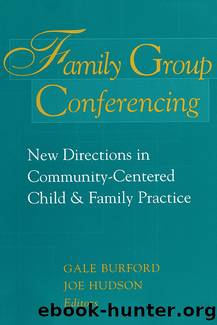Family Group Conferencing: New Directions in Community-Centered Child and Family Practice by Gale Burford

Author:Gale Burford [Burford, Gale]
Language: eng
Format: epub
Tags: Public Policy, Social Services & Welfare, Social Science, Political Science, Sociology, General
ISBN: 9781351520386
Google: jNwzDwAAQBAJ
Goodreads: 39207609
Publisher: Routledge
Published: 2017-09-04T00:00:00+00:00
JUST THERAPY PRACTICE AND FAMILY GROUP CONFERENCES
At the heart of the family group conference philosophy is the view that family relationships extend beyond the household or nuclear family unit. This was a major departure from mainstream theory and practice. It was an expression of Maori understanding of the nature of family rather than the standard view that owed its origins to the British heritage of the majority of the citizenry. Genealogical connections, extended family concepts, and communal processes were seen to offer greater safety for children than traditional mainstream approaches. Furthermore, the new philosophy of conferences involved a shift in power from professional decision-making and placement with or without family support, to extended family decision-making with the support of the authorities. The two groups were now required to work together for the greater good of the children involved. For Maori and Pacific Island families, this naturally involved the extended family of aunties, uncles, grandparents, and so on. Although there have been some exceptions due to underresourcing or family fragmentation, on the whole the young person or persons involved could be either placed and nurtured with close relatives or those relatives could support the immediate family to care for the young personâs needs.
This change of practice has certainly led to significant improvements, but progress has been marred by a number of deficiencies in New Zealand, which relate to underresourcing over time, the variation in skills of FGC coordinators, an inadequate understanding of the vastly differing definitions of self, and the tendency of state officials to overinfluence and constrain family processes. Despite these problems, the FGC has greatly improved family participation in decisionmaking in contrast to other areas of health and welfare services. Many young people (though unfortunately not all), who previously would have become lost in a distant institutional or foster system, now remain part of their extended families.
The FGC is a developed model for extended families to significantly contribute to decision-making when their children are at risk and have come to the notice of the authorities. As such, it offers a process, with a reasonably coherent theoretical underpinning, for families and authorities when working with young people at risk.
Just Therapy, on the other hand, offers a comprehensive approach to the range of problems families experience. Whereas the FGC has developed a particular process for one applied area of social work, Just Therapy has developed a coherent theory that provides the tools of reflection, analysis, and action for all areas of applied social policy. The FGC, having drawn on Maori cultural practice, has opened the way for more innovative and respectful ways for dealing with families in their specific area of operation. Just Therapy calls for this type of innovation in all spheres of applied social policy that will enable the field to recognize gender, cultural, and socioeconomic knowledge.
This involves a fundamental shift in power and meaning. At the heart of the Just Therapy approach is the recognition of womenâs knowledge and respect for their primary role in family life, recognition
Download
This site does not store any files on its server. We only index and link to content provided by other sites. Please contact the content providers to delete copyright contents if any and email us, we'll remove relevant links or contents immediately.
Spare by Prince Harry The Duke of Sussex(5197)
Tuesdays with Morrie by Mitch Albom(4784)
For Baby's Sake(4571)
Machine Learning at Scale with H2O by Gregory Keys | David Whiting(4313)
Never by Ken Follett(3957)
The Five People You Meet in Heaven by Mitch Albom(3569)
Fairy Tale by Stephen King(3399)
Reminders of Him: A Novel by Colleen Hoover(3119)
Will by Will Smith(2920)
Tuesdays With Morrie by Mitch Albom(2762)
The Clitoral Truth: The Secret World at Your Fingertips by Rebecca Chalker(2720)
Borders by unknow(2315)
Friends, Lovers, and the Big Terrible Thing by Matthew Perry(2230)
The Body Keeps the Score by Bessel van der Kolk MD(2217)
Cruel to Be Kind by Cathy Glass(2206)
The Stranger in the Lifeboat by Mitch Albom(2122)
Love on the Brain by Ali Hazelwood(2078)
Finding Chika by Mitch Albom(1968)
New Morning Mercies: A Daily Gospel Devotional by Paul David Tripp(1919)
